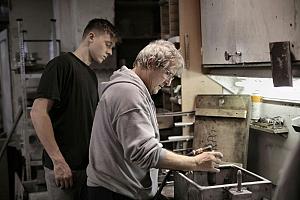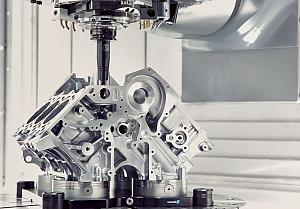Editor
- FMA
- The Fabricator
- FABTECH
- Canadian Metalworking
Form a digital manufacturing strategy before it’s too late
- By Joe Thompson
- October 1, 2018
As manufacturing shops evolve, it’s often the implementation of new technology that leads the change.
Manual machining was, for the most part, replaced by CNC machining, which is now evolving into highly automated CNC machining. It’s a natural progression for most shops. And now, thanks to advances in computing technology, those automated systems are just another node in the entire digital manufacturing network.
In a recent Deloitte survey of 193 C-level executives from around the world, “Distinctive traits of digital frontrunners in manufacturing,” authors Paul Wellener, Heather Ashton Manolian, and Stephen Laaper found that manufacturers at the forefront of digital manufacturing shared four common traits:
1. Adoption of a long-term, dynamic approach to digital strategy. It’s simple: A digital shop needs a digital strategy. This strategy needs to be introduced incrementally and be fluid and versatile enough to be truly dynamic.
The survey indicated that forward-thinking shops—those with a digital strategy—are nearly two times more likely to witness an increase in customer activity, including orders and inquiries, after an investment in advanced technology than those with no clear digital strategy.
2. Use of their “ecosystem” relationships. Industry 4.0 will create new business ecosystems by fundamentally changing the manufacturing landscape. New technology that features increased connectivity expands these ecosystems and connects them more directly to a company’s value chain partners. Early adopters of this technology are already seeking out new ecosystem relationships that create new value for customers.
3. Confidence in leadership and workforce talent. A shop’s current work pool must adapt to new, advanced technologies to be successful.
In the coming years manufacturing workers will increasingly work alongside robotic systems of some kind. Recent surveys show, however, that most manufacturing executives don’t currently have a plan in place for this workforce change. Frontrunners are making plans for this; stragglers simply aren’t.
4. Customer-centric innovation powered by technology. New manufacturing technology will disrupt the industry. But it’s up to manufacturing leaders to decide if it will be a positive disruption or a negative one. The Deloitte study found that manufacturers that adopt new digital technology are more likely to transform that adoption into sales.
The Digital Age of Manufacturing isn’t coming, it’s here. Don’t get left behind.
subscribe now


Keep up to date with the latest news, events, and technology for all things metal from our pair of monthly magazines written specifically for Canadian manufacturers!
Start Your Free SubscriptionAbout the Author

Joe Thompson
416-1154 Warden Avenue
Toronto, M1R 0A1 Canada
905-315-8226
Joe Thompson has been covering the Canadian manufacturing sector for more than two decades. He is responsible for the day-to-day editorial direction of the magazine, providing a uniquely Canadian look at the world of metal manufacturing.
An award-winning writer and graduate of the Sheridan College journalism program, he has published articles worldwide in a variety of industries, including manufacturing, pharmaceutical, medical, infrastructure, and entertainment.
- Industry Events
ZEISS Quality Innovation Days 2024
- April 15 - 19, 2024
Tube 2024
- April 15 - 19, 2024
- Düsseldorf, Germany
Lincoln Electric's Large Format 3D Metal Printing Seminar
- April 16 - 17, 2024
- Cleveland, OH
CTMA Economic Uncertainty: Helping You Navigate Windsor Seminar
- April 30, 2024
- Windsor, ON Canada
MME Winnipeg
- April 30, 2024
- Winnipeg, ON Canada





















